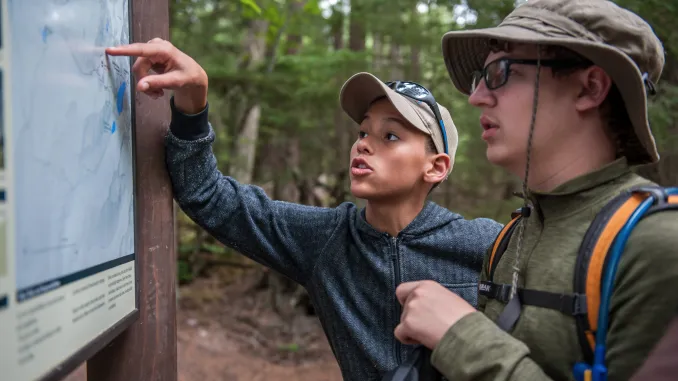
Actually, today’s students do know much about history, biology and science books.
These days, it’s the real-life skills that are missing from the classroom. Subjects like first aid, cooking and personal finance aren’t covered during the seven hours students spend at school each day.
These are skills young people don’t just need but want.
A new survey conducted by YPulse, a leader in youth research, offers fresh insight on the subject. The researchers identified specific subject areas that Gen Zers say they aren’t learning in school — but wish they were.
Gen Z typically refers to young people born between the mid-to-late 1990s and the early 2010s. That means the group includes all Venturers, all Sea Scouts and all but the youngest members of Scouts BSA.
You don’t need a GPS device to see where we’re going here.
Most of the not-taught-in-school skills Gen Zers crave are offered in Scouting — either directly (through a merit badge or rank requirement) or indirectly (as a side effect of being a member of a patrol and troop).
YPulse listed 18 real-life skills that Gen Zers wish they were learning in school. Below, we’ll go over that list one by one and share the Scouting perspective.
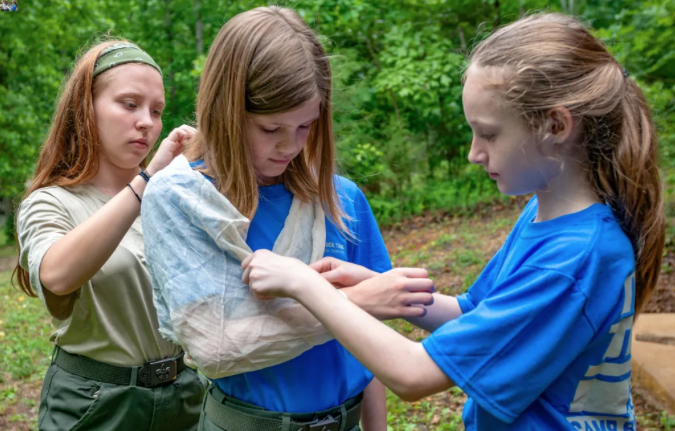
Real-life skills Gen Zers want
Listed here, in order, are the skills Gen Zers crave most. The number in parentheses is the percentage of respondents who said they wished they were learning that particular skill.
1. Mental health (37%)
Being a teen in the 2020s is tough — and that was before the pandemic hit. YPulse research found that 55% of 13- to 20-year-olds say the pandemic has negatively impacted their mental health.
But there’s hope. Research has shown that being outside can improve a person’s mental health by lowering stress and boosting a person’s mood.
Scouts know the best parts of Scouting happen in nature — away from anxiety-producing screens and out in the wilderness.
(If you or someone you know is thinking about suicide or needs emotional support, call the National Suicide Prevention Lifeline at 1-800-273-8255. To read more about psychological first aid, read this BSA Safety Moment.)
2. Self-defense (36%)
Bullying awareness is a critical part of the BSA’s mandatory Youth Protection training for adults and youth members. It starts with encouraging Scouts to follow the Scout Oath and Scout Law in their actions in Scouting, at school and at home.
But it goes even further. Scouts learn to “Be Upstanding,” which refers to powerful tools for identifying and responding to bullying.
3. Survival skills and basic first aid (35%)
YPulse combined these two skills, but in Scouts BSA, each gets its own merit badge.
Through the Wilderness Survival and First Aid merit badges, Scouts learn to respond to unexpected events.
The Wilderness Survival merit badge conjures images of Scouts building shelters out of tree branches (that’s literally the image on the merit badge emblem), but it’s about more than that. It’s about building confidence in young people that they can calmly respond to emergencies without having to look up the answer on YouTube.
The same is true of the Eagle-required First Aid merit badge, where Scouts practice treating wounds, performing CPR and rescuing a choking victim — skills that could (and have) save lives.
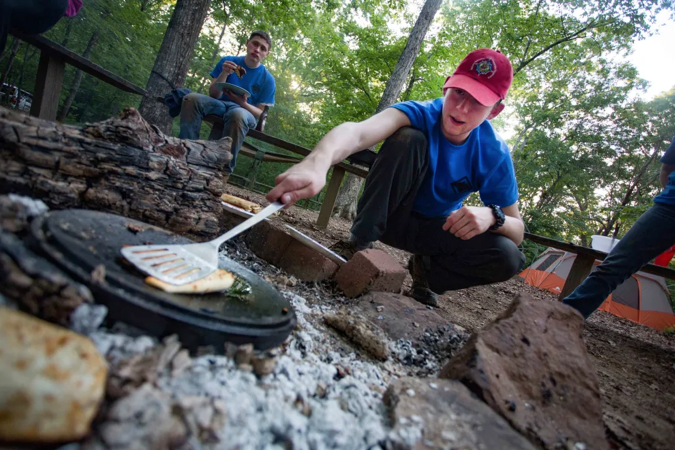
4. Cooking (34%)
As schools cut budgets and put more of their focus on preparing students for standardized tests, courses like home economics were some of the first to go.
And during a busy weeknight, what parent has the time (or patience) to teach their child how to cook?
That’s where Scouting comes in. With the Eagle-required Cooking merit badge, Scouts practice their kitchen skills — not to become culinary masters, necessarily, but to at least develop a comfort with this life skill.
5. Personal finance (32%)
Balancing a checkbook — or even simply writing a check — might be a skill Gen Zers never need. But the march toward a paperless economy doesn’t obviate the need for money management skills.
Enter the Eagle-required Personal Management merit badge. To earn it, Scouts must prepare a budget and track their spending over 13 weeks. As the world makes it easier and easier to buy something with just a tap, this skill is essential.
6. Communication skills (28%)
With job interviews, project presentations and even simple Zoom calls on the horizon, Gen Zers will encounter communications hurdles throughout their lives.
Anyone can become a skilled communicator, but it starts with acquiring the right tools. Thanks to the Eagle-required Communication merit badge, Scouts will Be Prepared with a skill required in every profession on the planet.
7. Emotional intelligence (28%)
Emotional intelligence, which Psychology Today defines as “the ability to identify and manage one’s own emotions, as well as the emotions of others,” isn’t covered in any merit badge.
But Scouting offers a unique opportunity for Scouts to work together to accomplish difficult things. A trek at Philmont Scout Ranch is the perfect example. Somewhere in those 10 days in the backcountry, you’re going to hit some speedbumps. Voices might be raised, and verbal arguments might arise. But when those issues get resolved, every member of the crew will be stronger for it. Their emotional intelligence will have been enhanced.
8. Time management (27%)
Scouts are masters of multitasking. We’ve met countless busy Scouting families, and we’re constantly impressed by how much they manage to accomplish each week. Balancing school, Scouting, sports and other extracurriculars requires careful planning and buy-in from every member of the family.
The time management skill Gen Zers practice in Scouting will help them in college and/or their career.
9. Basics of law (23%)
Binging classic episodes of Law & Order? Maybe not the best way to learn the ins and outs of the legal profession.
Scouts who want the basics of law — always a handy skill to take into life and a career — can look no further than the Law merit badge, where they’ll take a closer look at the legal profession.
10. Auto maintenance (23%)
Like home economics courses, auto shop classes used to be common at many high schools. But as school districts shifted away from these courses, young people either learned about cars from their parents or didn’t learn at all.
Scouting, once again, can fill the void. Gen Zers who earn the Automotive Maintenance merit badge get a crash course in car maintenance and safety.
11. Household repairs and maintenance (21%)
Thanks to YouTube, anyone can learn basic home-repair skills like how to fix a toilet, replace a pane of glass or varnish a piece of furniture.
But while a YouTube video can be paused and replayed again and again, it’s not interactive. The Home Repairs merit badge, on the other hand, most definitely is. Scouts work with a qualified counselor to practice skills they might need when they move into their own place some day.
12. Nutrition (20%)
Knowing how to cook is level one. Knowing what to cook and how that food will give your body the nutrients it needs? That requires some next-level skills.
The Eagle-required Cooking merit badge (making its second appearance on this list) has Scouts covered there. The badge has a whole requirement about nutrition, helping Gen Zers think about their eating habits and how they might eat healthier.
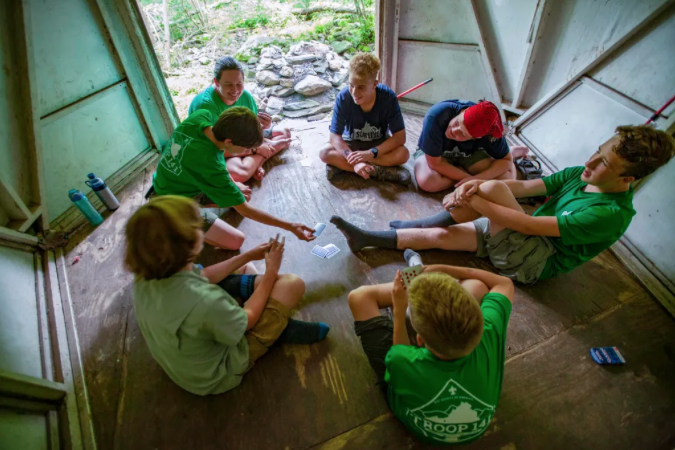
13. Relationship counseling (18%)
As a patrol leader or senior patrol leader, Scouts may be called upon to mediate when two Scouts aren’t getting along.
Though the Scoutmaster or another trusted adult should be standing by if needed, many minor disagreements can be resolved by a youth leader who knows how to defuse tension — show empathy, listen to both sides and work toward a compromise.
At school, where teachers and administrators step in right away, Gen Zers don’t get that valuable experience.
14. Sewing (16%)
Included on the list of skills Gen Zers crave is one their parents crave, too. Especially parents of Scouts who have earned lots and lots of merit badges.
Sewing, whether with a machine or by hand, can help a person throughout life. And many Scouts learn how to sew either by choice or out of necessity.
Lost button? Sew on a new one! Hole in your backpack? Stitch it back together! Ripped jeans? Consider it fashionable! (Or sew on a cool-looking patch!) With this skill, the possibilities are endless.
15. Networking and relationship building (16%)
Many of the Scouts we’ve met have a beyond-their-years ability to talk to adults. They have confidence, poise and even an interesting story or two.
Networking ability is yet another skill Gen Zers can pick up in Scouting. Whether talking with a group of assistant Scoutmasters after a troop meeting or impressing community leaders at a board of review, Scouting offers ample opportunities to practice networking.
16. Family resource management (15%)
From that first Cub Scout meeting on, Scouting brings families closer together.
While Scouts BSA gives more chances for young people to work independently — and grow on their own — it still provides ways for families to connect. The Eagle-required Family Life merit badge is a perfect example. Through conversations with a parent or guardian, Scouts discuss why they’re important to the family and how the actions of one family member affect the others.
17. Negotiation (14%)
Reaching a compromise between two parties in disagreement can feel impossible. But not for Scouts.
Scouts get to practice negotiation when the stakes are low — “I want to cook jambalaya!” “But I want red beans and rice!” — which helps them Be Prepared for more stressful situations.
18. Digital etiquette (13%)
Some day, Gen Zers will use their phones to file their income taxes or buy a home.
But for now, those devices can bring a different kind of anxiety through cyberbullying and other digital dangers.
While their teachers may tell them to keep their phones out of sight, Scouting encourages young people to actively think about these devices and their responsible use. Tools like the BSA’s Cyber Chip help young people know how to be friendly, courteous and kind online.
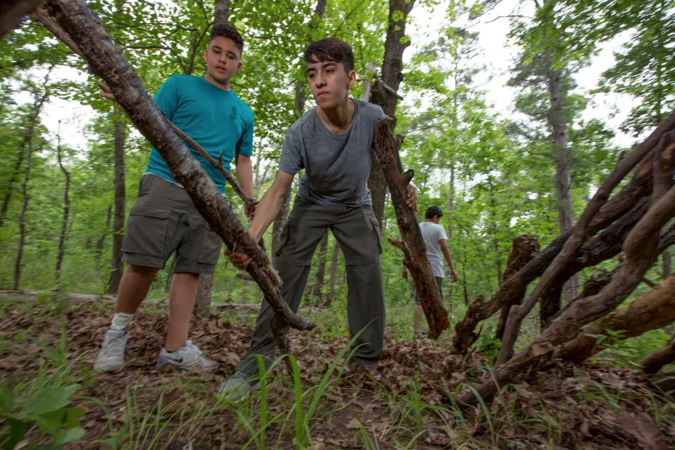
Now it’s your turn
Read the YPulse story here. And tell us: What skills did you learn in Scouting — but not in school — that have helped you in life?
This post was originally published on the Bryan on Scouting blog on February 16, 2022.
 New Birth of Freedom Council, BSA Website for the New Birth of Freedom Council, BSA
New Birth of Freedom Council, BSA Website for the New Birth of Freedom Council, BSA
